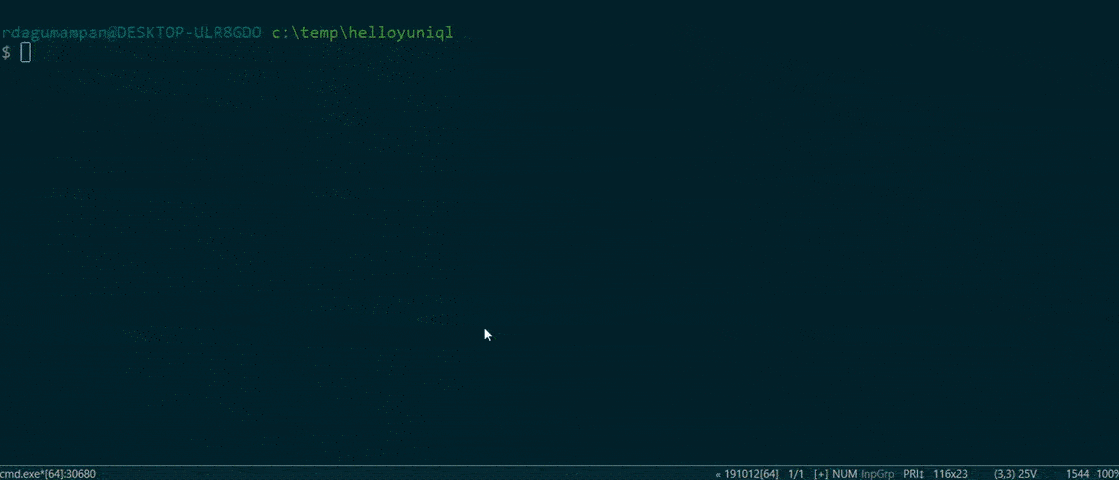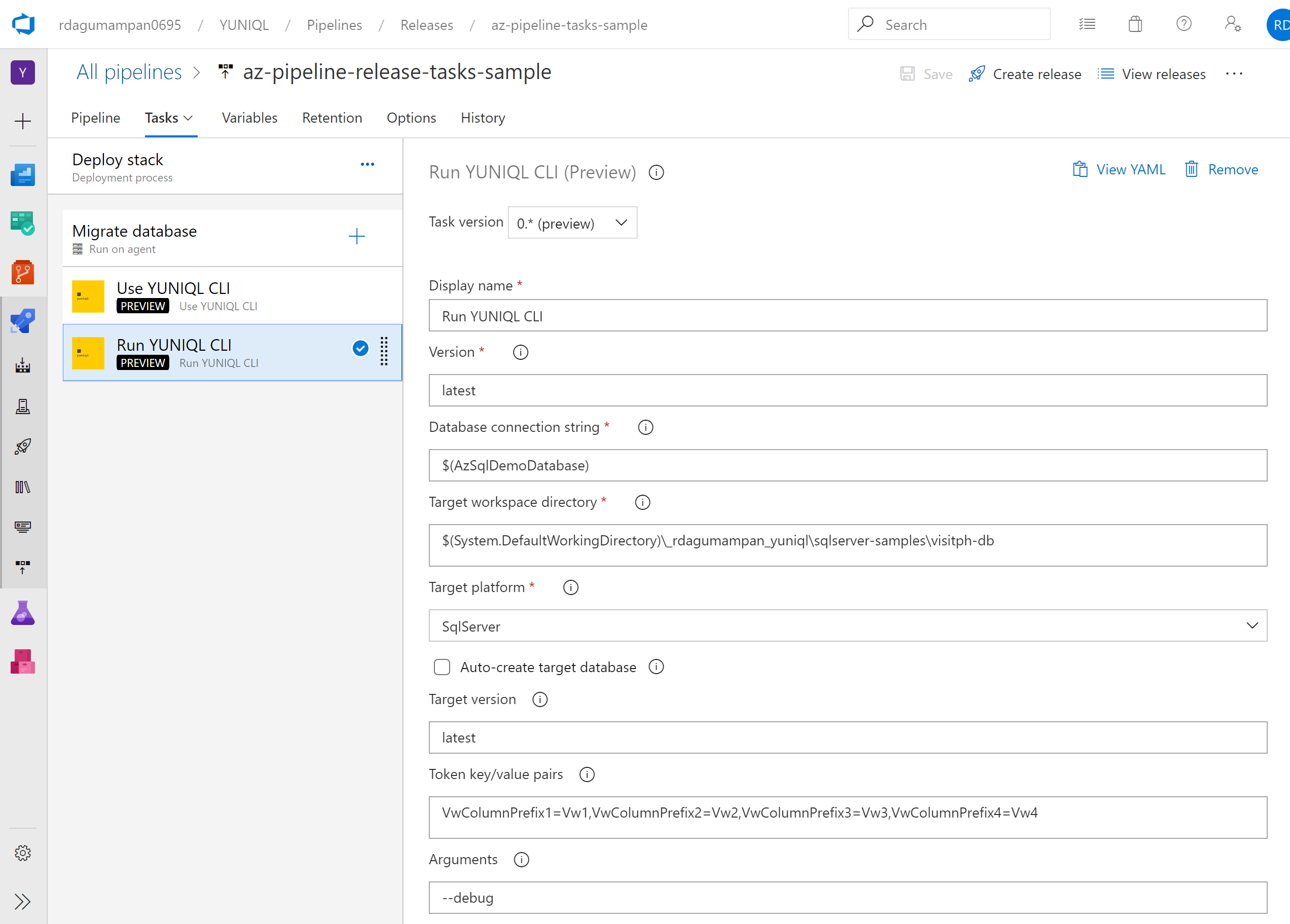yuniql (yuu-nee-kel). Free and open source schema versioning and database migration engine made natively with .NET Core. Use plain SQL scripts, bulk import CSV, integrate CI/CD pipelines, zero runtime dependencies and works with windows and linux. Supports SqlServer, PostgreSql, MySql, MariaDB, Snowflake, and Amazon Redshift.
Manage local db versions and run database migrations from your CLI tool. Perform local migration run or verify with uncommitted runs to test your scripts. Install yuniql CLI with Chocolatey or use alternative ways listed here https://yuniql.io/docs/install-yuniql
choco install yuniqldocker run -d -e "ACCEPT_EULA=Y" -e "MSSQL_SA_PASSWORD=P@ssw0rd!" -p 1400:1433 -d mcr.microsoft.com/mssql/server:2017-latest
SETX YUNIQL_CONNECTION_STRING "Server=localhost,1400;Database=yuniqldb;User Id=SA;Password=P@ssw0rd!"
SETX YUNIQL_WORKSPACE "c:\temp\yuniql-cli\samples\basic-sqlserver-sample"git clone https://github.com/rdagumampan/yuniql.git c:\temp\yuniql-cli
cd c:\temp\yuniql-cli\samples\basic-sqlserver-sample
yuniql run -a --platform sqlserver
yuniql list --platform sqlserver
Running yuniql v1.0.1 for windows-x64
Copyright 2019 (C) Rodel E. Dagumampan. Apache License v2.0
Visit https://yuniql.io for documentation & more samples
+---------------+----------------------+------------+---------------+----------------------+--------------+
| SchemaVersion | AppliedOnUtc | Status | AppliedByUser | AppliedByTool | Duration |
+---------------+----------------------+------------+---------------+----------------------+--------------+
| v0.00 | 2021-02-04 06:06:46Z | Successful | sa | yuniql-cli v1.1.55.0 | 164 ms / 0 s |
+---------------+----------------------+------------+---------------+----------------------+--------------+Amazon Aurora, Azure Synapse and Alibaba Aspara are being evaluated/developed/tested. For running migration from docker container, see instructions here.
| Platforms | Build Status | Description | Cloud Infrastructure | Documentation |
|---|---|---|---|---|
| sqlserver |  |
Sql Server 2017, 2019, latest | Azure, GCP, AWS | Get started |
| postgresql |  |
PostgreSql v9.6, v12.1, latest | Azure, GCP, AWS | Get started |
| mysql |  |
MySql v5.7, v8.0, latest | Azure, GCP, AWS | Get started |
| mariadb |  |
MariaDb v10.2, latest | Azure, GCP, AWS | Get started |
| snowflake |  |
Preview in v1.1.55 (latest) | Azure | Get started |
| redshift |  |
Preview in v1.1.55 (latest) | AWS | Get started |
| synapse | development | Preview build ETA mar 27 2021 | Azure |
NOTE: Supported cloud platforms are based on limited testing and community feedbacks where users indicated the platform they were attempting to run against. yuniql primarily uses Amazon RDS as cloud provider for non-vendor specific platforms.
| Distributions | Build Status | Description |
|---|---|---|
| Docker image linux-x64 |  |
docker pull yuniql/yuniql:linux-x64-latest |
| Docker imiage win-x64 |  |
docker pull yuniql/yuniql:win-x64-latest |
docker run -d -e POSTGRES_USER=sa -e POSTGRES_PASSWORD=P@ssw0rd! -e POSTGRES_DB=yuniqldb -p 5432:5432 postgres
SETX YUNIQL_CONNECTION_STRING "Host=localhost;Port=5432;Username=sa;Password=P@ssw0rd!;Database=yuniqldb"
SETX YUNIQL_WORKSPACE "c:\temp\yuniql-cli\samples\basic-postgresql-sample"git clone https://github.com/rdagumampan/yuniql.git c:\temp\yuniql-cli
cd c:\temp\yuniql-cli\samples\basic-postgresql-sample
yuniql run -a --platform postgresql
yuniql list --platform postgresqlRun your database migration from Azure DevOps Pipelines. The tasks downloads package and cache it for later execution just like how Use .NET Core or Use Node tasks works. Find Yuniql on Azure DevOps MarketPlace. Developer guide is available here https://yuniql.io/docs/migrate-via-azure-devops-pipelines.
Run your database migration thru a Docker container. This is specially helpful on Linux environments and CI/CD pipelines running on Linux Agents as it facilitates your migration without having to worry any local installations or runtime dependencies. Developer guide is available here https://yuniql.io/docs/migrate-via-docker-container.
git clone https://github.com/rdagumampan/yuniql.git c:\temp\yuniql-docker
cd c:\temp\yuniql-docker\samples\basic-sqlserver-sample
docker build -t sqlserver-example .
docker run sqlserver-example -c "<your-connection-string>" -a --platform sqlserverRun your database migration when your ASP.NET Core host service starts up. This ensures that database is always at latest compatible state before operating the service. Applies to Worker and WebApp projects. Developer guide is available here https://yuniql.io/docs/migrate-via-aspnetcore-application.
dotnet add package Yuniql.AspNetCoreusing Yuniql.AspNetCore;
...
...
//1. deploy new sql server on docker or use existing instance
//$ docker run -dit --name yuniql-sqlserver -e "ACCEPT_EULA=Y" -e "MSSQL_SA_PASSWORD=P@ssw0rd!" -p 1400:1433 -d mcr.microsoft.com/mssql/server:2017-latest
//2. create custom trace message sinks, this can be your own logger framework
var traceService = new ConsoleTraceService { IsDebugEnabled = true };
//3. run migrations
app.UseYuniql(traceService, new Yuniql.AspNetCore.Configuration
{
Platform = SUPPORTED_DATABASES.SQLSERVER,
Workspace = Path.Combine(Environment.CurrentDirectory, "_db"),
ConnectionString = "Server=localhost,1400;Database=helloyuniql;User Id=SA;Password=P@ssw0rd!",
IsAutoCreateDatabase = true, IsDebug = true
});Run your database migration when Console App starts. Developer guide is available here https://yuniql.io/docs/migrate-via-netcore-console-application.
dotnet add package Yuniql.Coreusing Yuniql.Core;
...
...
static void Main(string[] args)
{
//1. deploy new sql server on docker or use existing instance
//$ docker run -dit -e "ACCEPT_EULA=Y" -e "MSSQL_SA_PASSWORD=P@ssw0rd!" -p 1400:1433 -d mcr.microsoft.com/mssql/server:2017-latest
//2. create custom trace message sinks, this can be your own logger framework
var traceService = new ConsoleTraceService { IsDebugEnabled = true };
//3. configure your migration run
var configuration = Configuration.Instance;
configuration.Platform = SUPPORTED_DATABASES.SQLSERVER;
configuration.Workspace = Path.Combine(Environment.CurrentDirectory, "_db");
configuration.ConnectionString = "Server=localhost,1400;Database=helloyuniql;User Id=SA;Password=P@ssw0rd!";
configuration.IsAutoCreateDatabase = true;
//4. run migrations
var migrationServiceFactory = new MigrationServiceFactory(traceService);
var migrationService = migrationServiceFactory.Create();
migrationService.Run();- How to bulk import CSV master data
- How to replace tokens in script files
- How to run environment-aware migrations
- How to baseline your database
- How yuniql works
Please submit ideas for improvement or report a bug by creating an issue.
Alternatively, tag #yuniql on Twitter or drop me a message rdagumampanATgmail.com.
If this is your first time to participate in an open source initiative, you may look at issues labeled as first timer friendly issues. If you found an interesting case, you can fork this repository, clone to your dev machine, create a local branch, and make Pull Requests (PR) so I can review and merge your changes.
To prepare your dev machine, please visit https://github.com/rdagumampan/yuniql/wiki/Setup-development-environment
Copyright (C) 2019 Rodel E. Dagumampan
Licensed under the Apache License, Version 2.0 (the "License"); you may not use this file except in compliance with the License. You may obtain a copy of the License at http://www.apache.org/licenses/LICENSE-2.0
Unless required by applicable law or agreed to in writing, software distributed under the License is distributed on an "AS IS" BASIS, WITHOUT WARRANTIES OR CONDITIONS OF ANY KIND, either express or implied. See the License for the specific language governing permissions and limitations under the License.
Yuniql relies on many open-source projects and we would like to thanks:
- CommandlineParser for CLI commands
- CsvTextFieldParser for CSV file parsing
- Npgsql for PostgreSql drivers
- Shouldly for unit tests
- Moq for unit test mocks
- Evolutionary database design by Martin Fowler and Pramod Sadalage
- Microsoft, Oracle, for everything in dotnetcore seems open source now :)
- All the free devops tools! GitHub, AppVeyor, Docker, Shields.io ++






